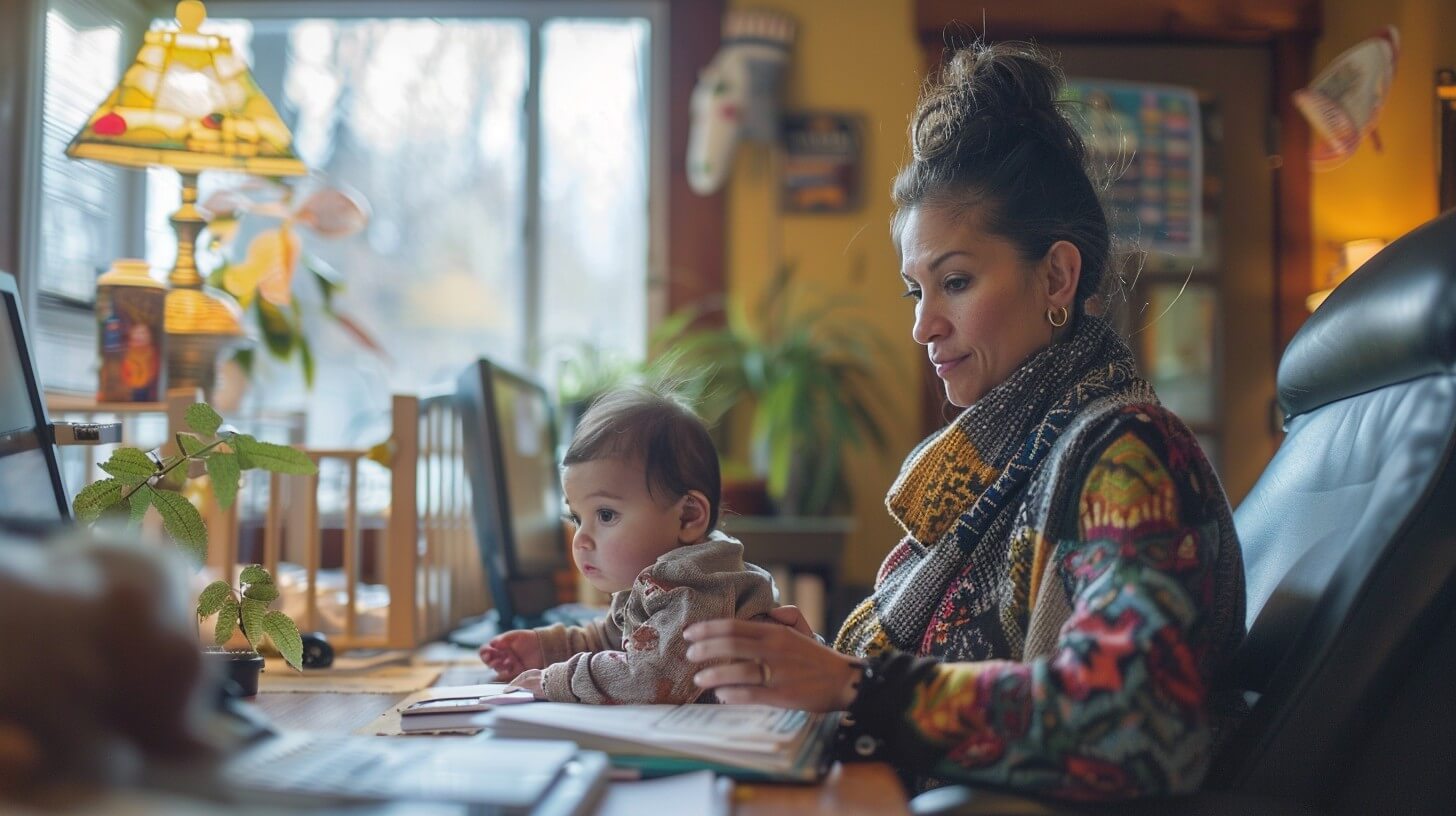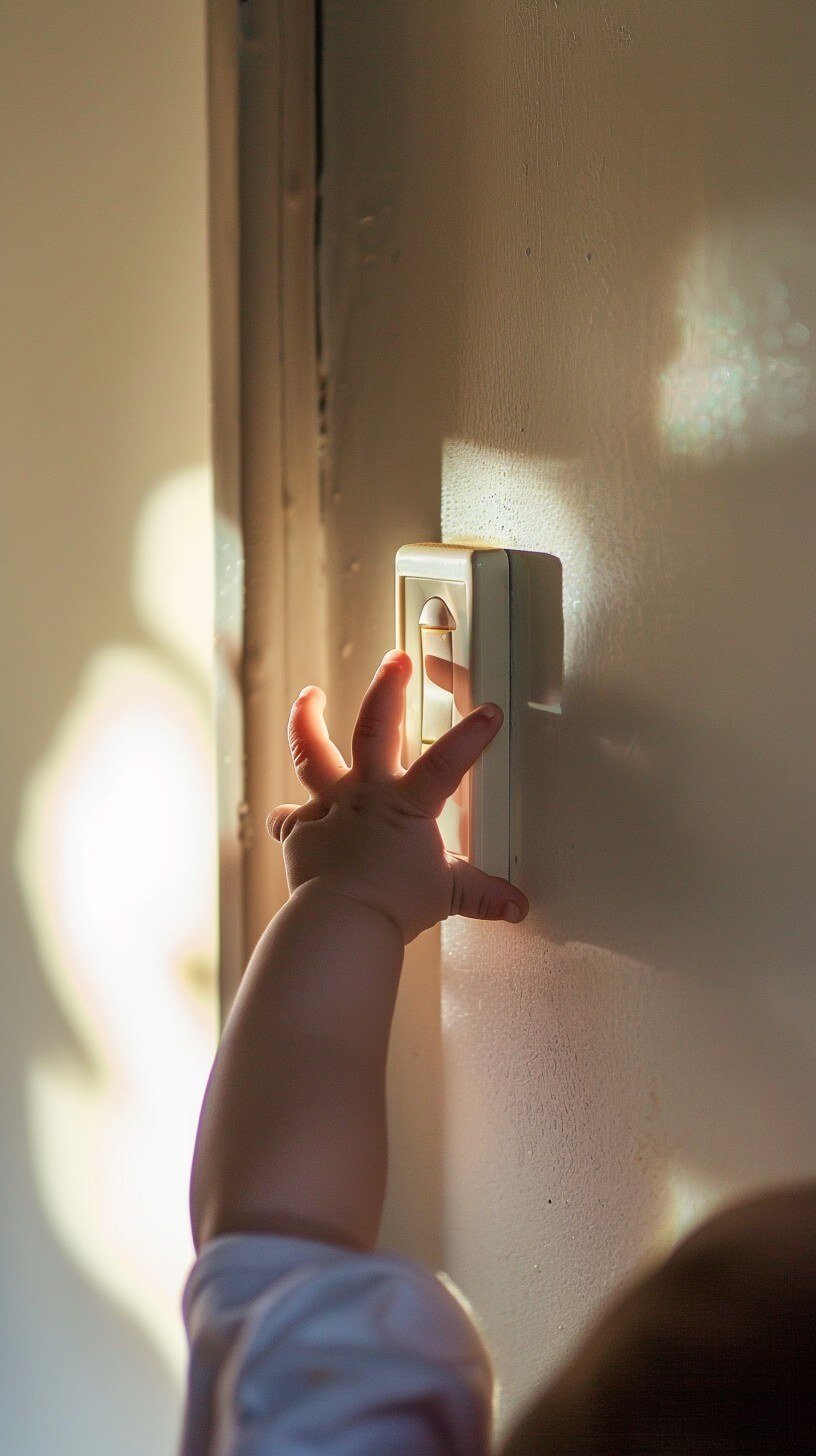What is Solo Parenting? Flying Solo: The Realities and Rewards
What is solo parenting? It’s a term that describes a situation where one parent is responsible for the upbringing of their child or children without the consistent involvement or support of a partner.
 Mom sitting at her office desk with her child n her lap.
Mom sitting at her office desk with her child n her lap.It is very different from co-parenting or single parenting, where two parents share the responsibilities, even if they are separated or divorced. The reasons for solo parenting vary widely.
It could be anything from a partner's absence due to work, military deployment, or incarceration.
Or a situation where one parent has passed away or a child is born into a single-parent household by choice or circumstance.
The Realities of Solo Parenting
Solo parenting comes with its own set of challenges and rewards. For those who are living as a solo parent and supporting children by themselves it’s a good idea to understand what solo parenting is all about.
Emotional and Physical Demands:
Solo parenting requires immense emotional strength. You are the primary (or sole) source of love, support, discipline, and care for your child.
This can be exhausting, as you may not have someone to share the burden with.
The physical demands, from managing the household to ensuring your child’s needs are met, can be overwhelming.
The lack of a partner to lean on during tough times often means that solo parents need to build a strong support network to help them navigate these demands.
Financial Responsibility: One of the most significant aspects of "what is solo parenting" involves handling all the financial responsibilities alone.
Unless you have a really high paying job, getting by on a single income can be difficult.
Solo parents often have to budget carefully, manage unexpected expenses, and make sacrifices to ensure their child’s needs are met.
Accessing financial support through government programs, child support, or community resources can be essential for many solo parents.
 Dad sitting at his office desk while on his laptop with his child on his lap.
Dad sitting at his office desk while on his laptop with his child on his lap.Decision-Making: Without a partner to consult, solo parents must make all major decisions regarding their child’s welfare on their own.
From being available to support your children to setting rules and boundaries to choosing healthcare providers and so much more.
The pressure of making the "right" decision can feel intense, and it’s common for solo parents to second-guess themselves.
However, this responsibility also allows solo parents to raise their children according to their values and beliefs without the need for compromise.
The Strengths and Positives of Solo Parenting
While solo parenting is undoubtedly challenging, it also has its unique strengths.
Understanding solo parenting also means recognizing the resourcefulness, and deep bonds that often develop in these family structures.
Building Strong Bonds: Solo parents often develop incredibly close relationships with their children.
You are the only parent your child has to turn to, so the time you spend together can create a deep and trusting bond.
Children in solo-parent households often appreciate the sacrifices their parent makes and may develop a strong sense of empathy and responsibility.
Teaching Independence: In many solo-parent households, older kids learn independence early. Often assisting with things like household chores and taking care of their younger siblings.
Any extra help that they offer makes the household run more smoothly.
Personal Growth: Solo parents often experience significant personal growth. They easily get through challenges, solve problems creatively and manage their time effectively.
Because they can overcome these difficulties so easily, for them solo parenting can be incredibly empowering.
What is Solo Parenting Specific Challenges
Understanding what solo parenting is, also involves acknowledging the specific challenges that come with this role.
While every parent faces difficulties, solo parents often encounter particular issues that can be more intense or frequent.
 Mom sitting at the table going through some important papers, while her child is on her lap.
Mom sitting at the table going through some important papers, while her child is on her lap.Isolation: Solo parents may feel isolated, both socially and emotionally.
Without a partner to share daily experiences with, they may feel lonely or disconnected.
Building a supportive network of friends,
family, or other solo parents can help alleviate this isolation.
Balancing Work and Parenting:
For many solo parents, balancing work and parenting is a constant struggle.
Without another adult to share the responsibilities, managing work schedules, childcare, and household tasks can become overwhelming.
Ask your employer if it would be possible to work from home or make some adjustments to your work schedule so that you can be home for your kids.
Emotional Well-being: Solo parenting can take a toll on mental health. The stress of managing everything alone, coupled with potential financial strain and social isolation, can lead to feelings of anxiety, depression, or burnout.
It's essential for solo parents to prioritize self-care, seek support when needed, and consider professional counselling if they find themselves struggling emotionally.
Support Systems for Solo Parents
Having a strong support system is essential for solo parents. It also means recognizing the importance of community and self-care.
Family and Friends: Leaning on family and friends for support can make a significant difference. Whether it’s help with childcare, someone to talk to, or assistance with daily tasks.
Having a reliable support network can alleviate some of the pressures of solo parenting.
 Mom sitting at her desk on her lap top, with toys all over her desk and on the floor and her child is sitting on the floor. Mom looks angry.
Mom sitting at her desk on her lap top, with toys all over her desk and on the floor and her child is sitting on the floor. Mom looks angry.Support Groups: Many communities offer support groups specifically for solo parents. You can even try online communities, if you have any experiences, questions or concerns you can get support from people all over the world.
Professional Help: Don’t hesitate to seek professional help if needed. It could be financial advice, counseling, or parenting resources, they each provide guidance and support that can make solo parenting more manageable.














